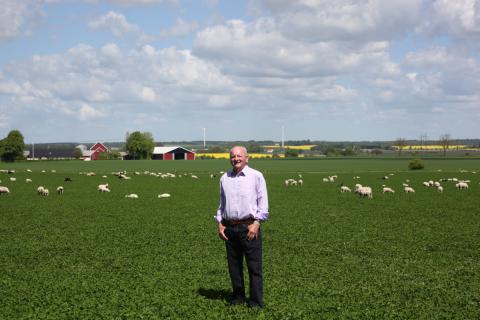7 June 2018
A Welsh sheep breeder has made changes to his artificial insemination programme to further improve conception rates in his performance-recorded flock following a Farming Connect Management Exchange funded visit to Denmark and Sweden.
Alwyn Phillips, of Penygelli Farm, near Caernarfon, had used cervical insemination in combination with fresh semen on his flock of performance-recorded Texels and Poll Dorsets since 1983.
But, following lessons learned during his visit to Denmark and Sweden, two countries which achieve higher conception rates using frozen semen, he is now adopting this approach.
Mr Phillips was awarded a bursary to study how techniques used in these Scandinavian countries could be implemented in Wales to enhance its own cervical AI programme.
He is now encouraging others to apply to the Farming Connect Management Exchange programme – the application window for the 2018-2019 programme is open until June 30th.
He says it is more important than ever that farmers and foresters learn new skills to make their businesses more efficient as Wales prepares for changes to the subsidy system in the next five years.
“Applying to the Farming Connect Management Exchange gives Welsh farmers across all sectors a massive opportunity to achieve this,’’ he says.
With changes to any business taking five years or more to fully implement, Mr Phillips urges potential applicants to act now and benefit from the Farming Connect funding.
He chose Denmark and Sweden for his study because Scandinavian countries have become world leaders in the cervical insemination of sheep using frozen semen as laparoscopic AI is prohibited.
Mr Phillips travelled nearly 2000 miles in six days, visiting six farms.
These farms achieve 50-70% conception rates using frozen semen – in UK trials conception rates have varied from 5-30%.
“Scandinavian countries have developed a method of cervical insemination of sheep using frozen semen out of necessity”.
“If their success could be mirrored in Wales, it presents a “huge opportunity’ to improve the national flock,” he insists.
“This could benefit producer and processor alike by reducing the number of carcasses that fail to achieve the desired grade in the EUROP grid, thus improving farm profitability and lowering the cost of processing as well as reducing waste in the plant.
“Cervical insemination using frozen semen gives us an opportunity to rapidly improve the Welsh sheep industry, make our farming business more viable and more competitive in order to face the challenges coming our way in the next few years.’’
In Wales, most ewes in AI breeding programmes are inseminated laparoscopically but this is a high cost and invasive procedure with associated risks.
Mr Phillips says his visit to Denmark and Sweden had demonstrated just how successful cervical insemination using frozen semen can be.
“AI offers access to superior genetics, reduces risks of importing diseases and a wider choice of proven rams. It allows the purchase of semen from rams to improve the individual ewe’s weaker EBVs, while avoiding risk of in-breeding.’’
It could be cheaper, he suggests, to buy semen from proven rams than to invest in a stock ram which may not improve the flock and, in some cases, might have a brief working life.
Mr Phillips believes Welsh sheep farmers could benefit from insemination training programmes similar to those offered to dairy farmers.
“Once trained, the breeder can have a flask on farm holding semen from different proven rams to be used on selected ewes,’’ he says.
Mr Phillips describes his farm visits in Sweden and Denmark as “enjoyable, informative and intense’’.
“The people I met were very open in sharing their expertise, their successes, but just as important what they learned from failures.
“I think the fact that I brought with me information about my flock was key to their willingness to share their knowledge. They answered every question I asked of them and in return I honestly answered questions about my flock and performance recording.’’

